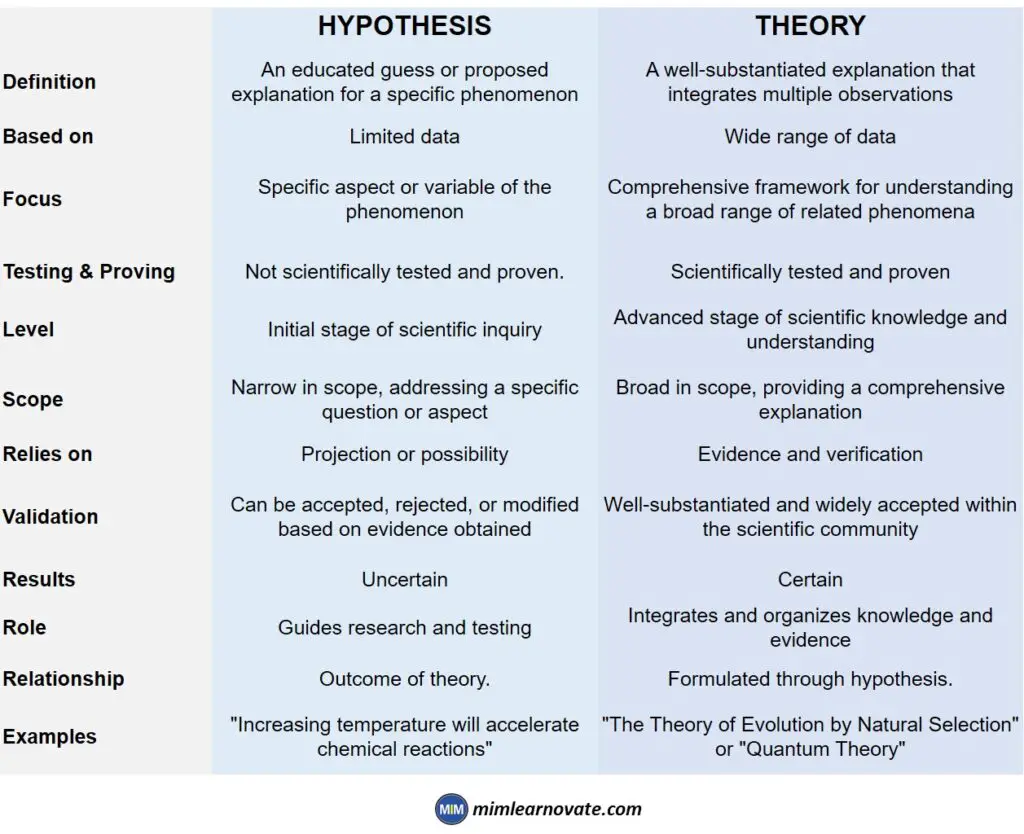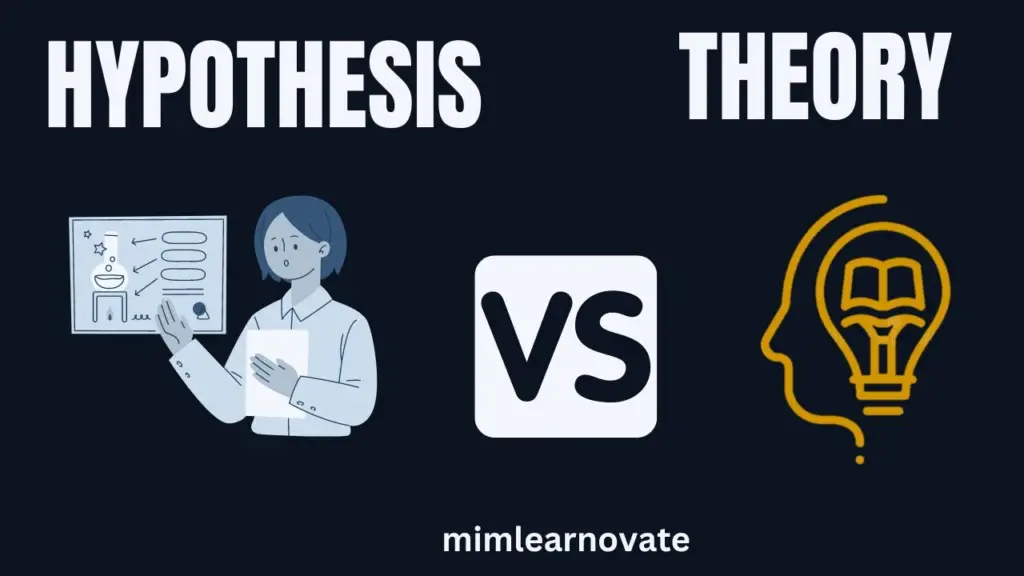A hypothesis is used in the research process to suggest new experiments and observations. Many experiments are carried out with the sole purpose of testing a hypothesis. It refers to a supposition about a relationship between different phenomena that can be observed.
The phrase “hypothesis” is frequently contrasted with the term “theory,” which is a thought, usually supported by evidence, that seeks to explain events and facts. Although theory and hypothesis are both essential components of developing an approach, they are not the same.
In this blog post, we’ll delve into the differences between these two fundamental concepts, shedding light on their unique characteristics and their roles in advancing scientific understanding.
Hypothesis
A hypothesis is like a curious spark that ignites the scientific process. It’s an educated guess, a proposition put forth to explain a specific observation or phenomenon.
Think of it as a starting point, a tentative explanation that serves as the foundation for scientific investigation.
Hypotheses are crafted based on existing knowledge, previous observations, and logical reasoning. They are designed to be tested through empirical research, allowing scientists to gather evidence that either supports or refutes the proposed explanation.
Key Traits of a Hypothesis:
- Tentative in nature, awaiting validation or refutation.
- Focuses on specific aspects or variables related to the phenomenon.
- Testable through empirical research and experimentation.
- Subject to acceptance, rejection, or modification based on evidence obtained.
Theory
Now, let’s turn our attention to the grandeur of scientific theories. A theory is not a mere guess or conjecture, but a robust and comprehensive framework that goes beyond individual hypotheses.
It is an extensively supported explanation that weaves together a vast array of observations, facts, and empirical evidence.
A theory serves as the pinnacle of scientific understanding, offering a coherent and powerful explanation for a broad range of related phenomena.
Characteristics of a Theory:
- Well-substantiated and widely accepted in the scientific community.
- Embraces multiple hypotheses and integrates diverse observations.
- Provides a comprehensive framework for understanding and explaining a phenomenon.
- Grounded in rigorous scientific investigation, data analysis, and experimental validation.
Difference between Hypothesis and Theory
While hypothesis and theory serve distinct purposes, they are interconnected within the scientific realm.
Hypotheses play a vital role as building blocks, forming the basis for scientific investigations and contributing to the development or refinement of theories. Through rigorous experimentation and accumulation of evidence, hypotheses can eventually become integral components of well-established theories.
This dynamic relationship between hypotheses and theories fuels scientific progress, deepening our understanding of the natural world.

- A hypothesis is a supposition that serves as the basis for further research or investigation and is supported by few pieces of evidence. A theory is a supported explanation of a natural phenomenon that is frequently supported by observation and experiment.
- The theory is based on a wide set of data, whereas the hypothesis is based on a little amount of data.
- The hypothesis is an unproven statement that can be tested. On the other hand, a theory is a scientifically tested and proven explanation of a fact or event.
- A hypothesis is based on predictions, suggestions, possibilities, or projects, however a theory is supported by evidence that is proved.
- The hypothesis may or may not be proven correct, hence the result is uncertain. The theory, on the other hand, is one that is assumed to be true and hence the result is certain.
- The scientific method has two levels: hypothesis and theory. Theory comes after hypothesis, and hypothesis serves as the foundation for investigation, the outcome of which is a theory.
| HYPOTHESIS | THEORY | |
| Definition | An educated guess or proposed explanation for a specific phenomenon | A well-substantiated explanation that integrates multiple observations |
| Based on | Limited data | Wide range of data |
| Focus | Specific aspect or variable of the phenomenon | Comprehensive framework for understanding a broad range of related phenomena |
| Testing & Proving | Not scientifically tested and proven. | Scientifically tested and proven |
| Level | Initial stage of scientific inquiry | Advanced stage of scientific knowledge and understanding |
| Scope | Narrow in scope, addressing a specific question or aspect | Broad in scope, providing a comprehensive explanation |
| Relies on | Projection or possibility | Evidence and verification |
| Validation | Can be accepted, rejected, or modified based on evidence obtained | Well-substantiated and widely accepted within the scientific community |
| Results | Uncertain | Certain |
| Role | Guides research and testing | Integrates and organizes knowledge and evidence |
| Relationship | Outcome of theory. | Formulated through hypothesis. |
| Examples | “Increasing temperature will accelerate chemical reactions” | “The Theory of Evolution by Natural Selection” or “Quantum Theory” |
Conclusion:
In the captivating world of scientific exploration, hypotheses and theories play indispensable roles.
Hypotheses serve as the sparks of curiosity, guiding focused research and testing, while theories provide overarching frameworks that integrate vast bodies of knowledge and evidence.
Both a hypothesis and a theory can be tested and refuted. When a hypothesis is proven true by passing all crucial tests and analysis, it becomes a theory.
So, the hypothesis differs greatly from theory in that the hypothesis is unproven, as the theory is a proven and tested statement.
By understanding the differences between hypothesis and theory, we gain a deeper appreciation for the scientific process and the remarkable journey of discovery.
Other articles
Please read through some of our other articles with examples and explanations if you’d like to learn more about research methodology.
Comparision
- Basic and Applied Research
- Cross-Sectional vs Longitudinal Studies
- Survey vs Questionnaire
- Open Ended vs Closed Ended Questions
- Experimental and Non-Experimental Research
- Inductive vs Deductive Approach
- Null and Alternative Hypothesis
- Reliability vs Validity
- Population vs Sample
- Conceptual Framework and Theoretical Framework
- Bibliography and Reference
- Stratified vs Cluster Sampling
- Sampling Error vs Sampling Bias
- Internal Validity vs External Validity
- Full-Scale, Laboratory-Scale and Pilot-Scale Studies
- Plagiarism and Paraphrasing
- Research Methodology Vs. Research Method
- Mediator and Moderator
- Type I vs Type II error
- Descriptive and Inferential Statistics
- Microsoft Excel and SPSS
- Parametric and Non-Parametric Test
Comparision
- Independent vs. Dependent Variable – MIM Learnovate
- Research Article and Research Paper
- Proposition and Hypothesis
- Principal Component Analysis and Partial Least Squares
- Academic Research vs Industry Research
- Clinical Research vs Lab Research
- Research Lab and Hospital Lab
- Thesis Statement and Research Question
- Quantitative Researchers vs. Quantitative Traders
- Premise, Hypothesis and Supposition
- Survey Vs Experiment
- Hypothesis and Theory
- Independent vs. Dependent Variable
- APA vs. MLA
- Ghost Authorship vs. Gift Authorship
Research
- Research Methods
- Quantitative Research
- Qualitative Research
- Case Study Research
- Survey Research
- Conclusive Research
- Descriptive Research
- Cross-Sectional Research
- Theoretical Framework
- Conceptual Framework
- Triangulation
- Grounded Theory
- Quasi-Experimental Design
- Mixed Method
- Correlational Research
- Randomized Controlled Trial
- Stratified Sampling
- Ethnography
- Ghost Authorship
- Secondary Data Collection
- Primary Data Collection
- Ex-Post-Facto
Research
- Table of Contents
- Dissertation Topic
- Synopsis
- Thesis Statement
- Research Proposal
- Research Questions
- Research Problem
- Research Gap
- Types of Research Gaps
- Variables
- Operationalization of Variables
- Literature Review
- Research Hypothesis
- Questionnaire
- Abstract
- Validity
- Reliability
- Measurement of Scale
- Sampling Techniques
- Acknowledgements
Statistics



